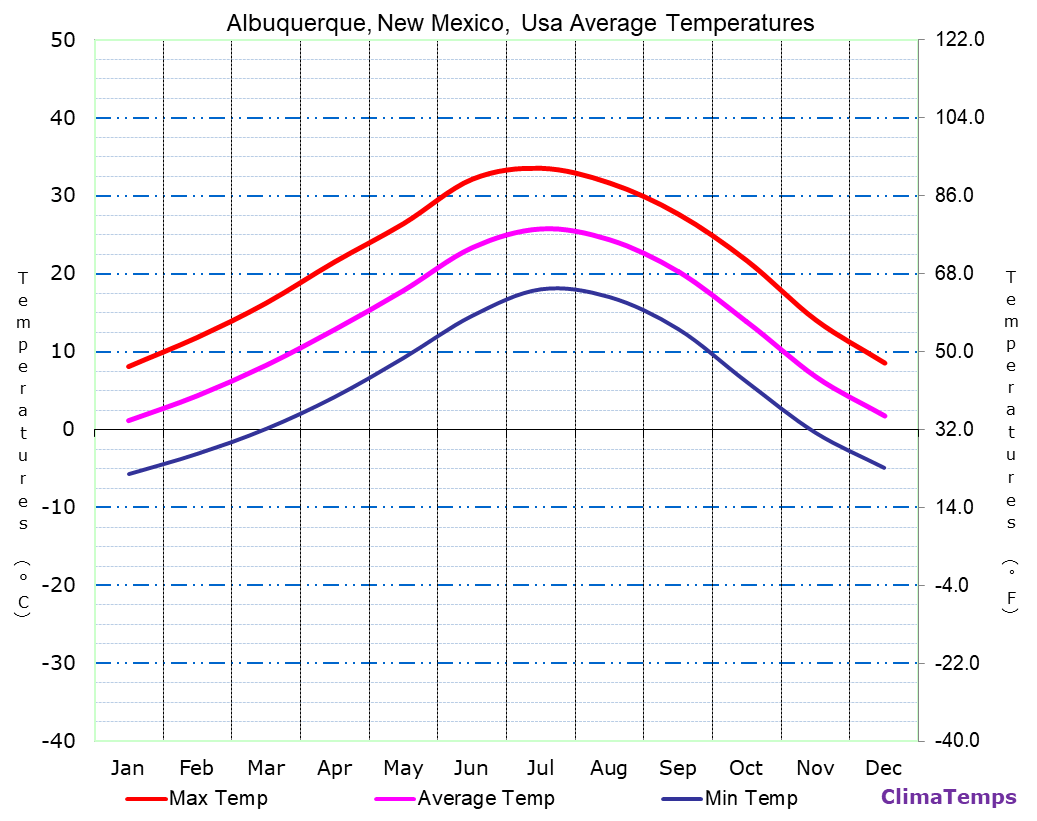Albuquerque, nestled in the heart of New Mexico, boasts a unique climate shaped by its high desert location. With distinct seasonal variations, understanding Albuquerque average temperatures is essential for residents and visitors alike. From scorching summer days to crisp winter mornings, the city experiences a range of weather patterns. This article delves into the nuances of Albuquerque's climate, offering insights into the factors that influence its average temperatures and how these impact daily life. Whether you're planning a trip or considering a move, this guide will equip you with the knowledge to prepare for what the city's weather has in store.
As a city located at an elevation of 5,312 feet, Albuquerque's climate is influenced by its geography, making it an interesting case study for meteorologists and weather enthusiasts. The average temperatures throughout the year reflect the city's semi-arid climate, characterized by warm summers and mild winters. Residents and visitors often find the weather agreeable, with pleasant spring and autumn seasons that make outdoor activities a year-round possibility. Understanding these patterns can enhance your experience in the city, ensuring you're prepared for any weather eventuality.
For those seeking a deeper understanding of Albuquerque's climate, this article provides a comprehensive overview of the city's average temperatures, seasonal variations, and the factors that contribute to its unique weather patterns. By examining historical data and current trends, we aim to offer valuable insights into what makes Albuquerque's climate so distinctive. Whether you're a long-time resident or a curious traveler, this guide will help you navigate the city's weather with confidence.
Read also:Maximize Your Savings A Comprehensive Guide To Shell Fuel Rewards
What Makes Albuquerque's Climate Unique?
Albuquerque's climate is shaped by its high desert environment, which contributes to its distinct seasonal variations. The city's elevation plays a significant role in determining its average temperatures, with cooler nights even during the summer months. This unique combination of warm days and cool evenings creates a microclimate that sets Albuquerque apart from other cities in the region. The semi-arid climate ensures low humidity levels, making the heat more bearable and the winters less harsh.
How Do Albuquerque Average Temperatures Vary by Season?
The city experiences four distinct seasons, each with its own temperature profile. Summers in Albuquerque are warm, with temperatures often reaching the high 90s Fahrenheit. However, the dry air makes the heat more tolerable compared to humid climates. Spring and autumn are characterized by mild temperatures, making them ideal for outdoor activities. Winters, on the other hand, are relatively mild, with temperatures rarely dropping below freezing. This seasonal variation contributes to the city's appeal as a year-round destination.
Why Are Albuquerque Average Temperatures Important for Residents?
For those living in Albuquerque, understanding the city's average temperatures is crucial for planning daily activities and preparing for weather changes. The semi-arid climate means that residents can enjoy outdoor pursuits throughout the year, provided they dress appropriately for the season. Additionally, knowledge of average temperatures helps homeowners and businesses plan for energy usage, ensuring efficient heating and cooling systems are in place. This awareness contributes to a more sustainable and comfortable living environment.
What Are the Key Factors Influencing Albuquerque's Climate?
- Elevation: At 5,312 feet, Albuquerque's altitude affects its temperature patterns.
- Geography: The city's location in the high desert contributes to its semi-arid climate.
- Seasonal Winds: Prevailing winds can influence temperature fluctuations.
How Do Albuquerque Average Temperatures Compare to Other Cities?
Compared to other cities in the southwestern United States, Albuquerque's climate is relatively mild. While cities like Phoenix experience extreme heat during the summer months, Albuquerque's higher elevation moderates temperatures, making the heat more bearable. Similarly, winters in Albuquerque are less severe than in cities further north, allowing residents to enjoy outdoor activities year-round. This comparison highlights the unique qualities of Albuquerque's climate and its appeal to those seeking a balanced weather experience.
What Impact Do Albuquerque Average Temperatures Have on Local Agriculture?
The city's average temperatures play a vital role in shaping local agriculture. Farmers in the region rely on the predictable seasonal variations to plan their planting and harvesting schedules. The mild winters and warm summers create favorable conditions for growing a variety of crops, including chiles, corn, and beans. Understanding these temperature patterns helps farmers optimize their yields and contribute to the local economy. This symbiotic relationship between climate and agriculture underscores the importance of monitoring average temperatures.
Understanding Historical Temperature Trends
Historical data provides valuable insights into Albuquerque's climate patterns, offering a long-term perspective on average temperatures. By examining temperature records over several decades, meteorologists can identify trends and predict future changes. This data is crucial for urban planning, infrastructure development, and disaster preparedness. Additionally, understanding historical temperature trends helps residents and visitors anticipate seasonal variations and plan accordingly.
Read also:Exploring The Sweetness Of H Mart Korean Pears A Comprehensive Guide
What Role Does Albuquerque Average Temperatures Play in Tourism?
For tourists, Albuquerque's average temperatures are a key factor in deciding when to visit the city. The pleasant spring and autumn seasons attract visitors seeking mild weather for outdoor activities, such as hiking and biking. Summer tourists enjoy the warm days, while winter visitors appreciate the mild temperatures for skiing and other winter sports. Knowledge of average temperatures helps travel agencies and hotels tailor their offerings to meet the needs of different seasons, enhancing the overall visitor experience.
How Can Residents Adapt to Albuquerque Average Temperatures?
Living in Albuquerque requires adapting to the city's unique climate. Residents often adopt strategies to cope with the seasonal variations, such as installing energy-efficient windows to regulate indoor temperatures. During the summer, staying hydrated and using sun protection becomes essential, while winter residents focus on layering clothing to stay warm during cooler nights. These adaptations ensure a comfortable lifestyle in harmony with the city's climate.
Conclusion: Embracing Albuquerque's Unique Climate
Albuquerque's climate, characterized by its semi-arid conditions and distinct seasonal variations, offers a unique weather experience for residents and visitors alike. Understanding Albuquerque average temperatures is key to enjoying the city's many outdoor activities and appreciating its natural beauty. By examining the factors that influence the city's climate and adapting to its temperature patterns, individuals can fully embrace what Albuquerque has to offer. Whether you're planning a trip or considering a move, this guide provides the insights needed to make the most of Albuquerque's distinctive climate.
Table of Contents
- What Makes Albuquerque's Climate Unique?
- How Do Albuquerque Average Temperatures Vary by Season?
- Why Are Albuquerque Average Temperatures Important for Residents?
- What Are the Key Factors Influencing Albuquerque's Climate?
- How Do Albuquerque Average Temperatures Compare to Other Cities?
- What Impact Do Albuquerque Average Temperatures Have on Local Agriculture?
- Understanding Historical Temperature Trends
- What Role Does Albuquerque Average Temperatures Play in Tourism?
- How Can Residents Adapt to Albuquerque Average Temperatures?
- Conclusion: Embracing Albuquerque's Unique Climate
/Albuquerque-5963ed533df78cdc68bf6442.jpg)

